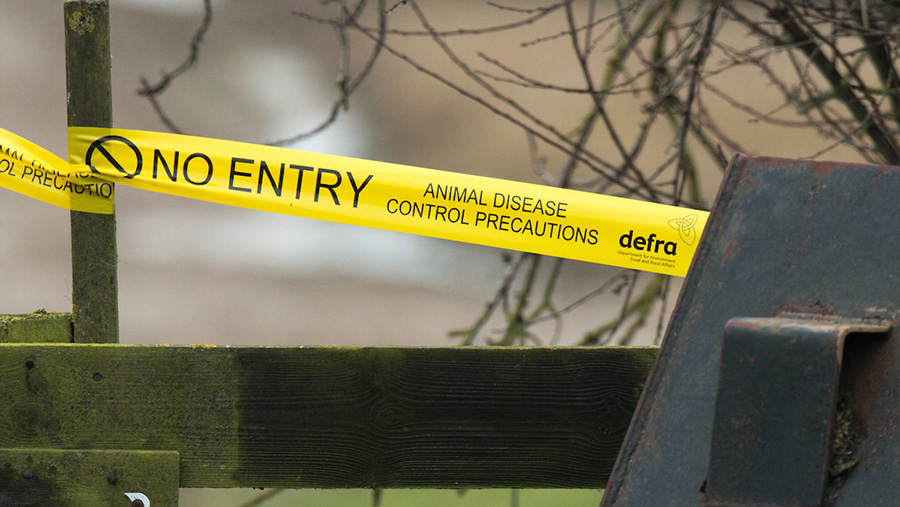Avian influenza outbreak confirmed on Kent farm
 © Tim Scrivener
© Tim Scrivener Poultry farmers are on high alert after a case of avian influenza has been reported on a poultry farm in Kent, Defra has confirmed.
Avian influenza of the H5N2 strain has been confirmed at a small commercial premises near Deal in Kent on Monday (2 November).
All 480 birds on site will be humanely culled to limit the spread of the disease.
See also: Avian influenza prevention tips and how to handle an outbreak
A 1km Low Pathogenic Avian Influenza (LPAI) restricted zone for captive birds has also been put in place around the infected farm to limit the risk of the disease spreading.
Defra chief vet Christine Middlemiss said: “Avian flu has been confirmed at a small commercial premises in Kent.
“Immediate steps have been taken to limit the risk of the disease spreading and all remaining poultry and captive birds at the farm will be culled.
“Public Health England has confirmed that the risk to public health is very low and the Food Standards Agency has said that bird flu does not pose a food safety risk for UK consumers.
There will be no impact on food supply as this business does not supply poultrymeat or eggs to the commercial food chain.”
Stay vigilant
Bird keepers should remain alert for any signs of disease (see “What to do if you suspect avian influenza on your farm”), report suspected disease immediately and ensure they are maintaining good biosecurity on their premises.
The government bodies are monitoring the situation to assess the risk to UK poultry.
A Defra spokesperson said: “We are urgently looking for any evidence of disease spread associated with this farm to control and eliminate it.”
Defra said the risk of bird flu occurring in the UK is “medium” in wild birds, and “low” in poultry, provided there’s a good standard of biosecurity.
“This is because the wild bird migration season is under way, and as winter approaches there will be an increasing risk from bird flu in the UK from migrating wild birds, which might infect domestic poultry,” a Defra spokesperson explained.
LPAI is a less serious strain of H5 avian influenza. It can cause mild breathing problems, but affected birds will not always show clear signs of infection.
The last confirmed case of LPAI in the UK was in mid Sussex in December 2019.
The UK has remained free of highly pathogenic avian influenza since September 2017.
A low pathogenic H5N3 strain of the disease, which poses no threat to human health, returned in December 2019 and was quickly dealt with by government action.
The UK declared itself free from avian influenza H5N3 in June.
Dutch and German cases
The news comes just days after the government issued a warning to poultry keepers to stay vigilant for the signs of avian flu following confirmation of two high-pathogenic cases of avian flu on farms in the Netherlands.
Meanwhile, in Germany, the Federal Ministry of Food and Agriculture has confirmed that avian influenza has been detected in a wild duck in Hamburg, a common buzzard in Mecklenburg-Western Pomerania and various wild birds in Schleswig-Holstein.
The highly pathogenic avian influenza virus strains are H5N8 and H5N5, which can cause serious disease to poultry and other birds, however the risk to humans is “low”.
Poultry farmers in Germany are being asked to take precautionary measures and monitor their flocks.
What to do if you suspect avian influenza on your farm
Bird flu is a notifiable animal disease and if it is suspected, poultry keepers must report it immediately by calling the Defra Rural Services Helpline on 03000 200 301.
Clinical signs that poultry keepers should look for in their birds include a swollen head, discolouration of neck and throat, loss of appetite, respiratory distress, diarrhoea and fewer eggs laid – although clinical signs vary between species of bird.
In Northern Ireland, keepers should contact their Daera direct regional offices or call the helpline on 0300 200 7840 (Mon-Fri 9am to 5pm).
In Wales, call 0300 303 8268. In Scotland, farmers should contact their local field services office. Failure to do so is an offence.
If the public find dead wild waterfowl (swans, geese or ducks) or other dead wild birds, such as gulls or birds of prey, they should report them to the Defra helpline (03459 33 55 77).
